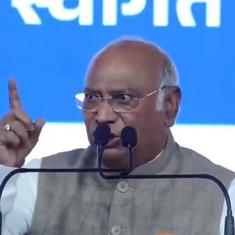Assam: Centre signs tripartite Bodo peace agreement, Amit Shah says ‘golden future’ awaits state
The home minister assured the National Democratic Front of Bodoland that ‘all promises will be fulfilled in a time-bound manner’.

The Centre and the Assam government on Monday signed an accord with banned insurgent group National Democratic Front of Bodoland, reported ANI. The government promised to fulfil the outfit’s key political and economic demands, including safeguarding the Bodo language and culture. A sports university and job-oriented higher-education institutions are expected to be part of the pact, according to PTI.
The agreement was signed by Union Home Minister Amit Shah, Assam Chief Minister Sarbananda Sonowal and the four factions of the militant group in New Delhi. The All Bodo Students’ Union, which has been spearheading a movement for a Bodoland state, was also signatory to the accord. The militants were led by Ranjan Daimari, Govinda Basumatary, Dhiren Boro and B Saoraigra. “As the home minister, I want to assure all representatives that all promises will be fulfilled in a time-bound manner,” ANI quoted Shah as saying after signing the pact. “This agreement will ensure a golden future for Assam and for the Bodo people.” He claimed that more than 1,500 members of the militant group would surrender on January 30.
“It is a historic accord,” said Union Home Secretary Ajay Bhalla, adding that the pact would bring comprehensive solution to all Bodo problems, reported The Telegraph.
The pact is the third such settlement with the Bodo groups since 1993, when the Bodo Accord was signed in Guwahati. That agreement had paved the way for the Bodoland Autonomous Council. However, the Bodos claimed that the accord did not fulfil their demands, and an armed movement for a separate Bodoland began. On February 10, 2003, the Assam government, the Centre and the Bodo Liberation Tigers signed a memorandum of settlement to form the present Bodoland Territorial Council, which includes Kokrajhar, Chirang, Baksa and Udalguri districts.
The push for the third agreement gathered momentum after the militants signed a suspension of operations agreement with the state and central governments. The agreement came after the top brass and cadre of the banned outfit crossed over to India from their bases in Myanmar on January 11 to join the peace process.
The details of Monday’s peace agreement are not yet available. The Bodoland Territorial Council is likely to gain more autonomy and may be accorded a special status after the pact comes into force, according to Northeast Now. The council may have special rights for the domiciles, and “outsiders” may have to obtain a “permit to work”. The settlement agreement also proposes that the Centre will grant “general amnesty to the convicts of the NDFB and withdraw all the cases and charges framed” against the outfit’s members and sympathisers.
Earlier in the day, a 12-hour Assam bandh was called by various non-Bodo organisations in protest against the peace accord. They demanded that all non-Bodo stakeholders in Bodoland Territorial Administrative districts, and the banned Kamtapur Liberation Organisation be included in the peace talks. The strike brought life to a standstill in the four districts under the Bodoland Territorial Council. However, there was no impact in other areas of the state, reported PTI.
A bloody history
The 1990s were the worst years of Bodo militancy – in 1993, more than 20,000 Muslims were displaced in Kokrajhar and Bongaigaon districts. The following year, more than 400 were killed in attacks on 60 villages.
In 1996, the National Democratic Front of Bodoland massacred more than 250 Adivasis, mostly in Kokrajhar district, and burnt down villages. In response, the Adivasis formed the Adivasi Cobra Force and Adivasi Birsa Force but none of them could stand the onslaught. As a result, more than two lakh Adivasis were displaced. Bodos were displaced too, but while they went back the other groups languished in refugee camps. Within a few years this area became home to the country’s largest group of internally displaced persons.
In 1998, more than 50 people were killed, more than 500 homes were burnt down and 70,000 people were displaced as Bodos and Adivasis clashed in Gossaigaon sub-division of Kokrajhar district.
The next wave of violence was in 2008, when clashes between Bodos and Muslims left more than 100 dead and displaced a lakh and a half. On October 30, 2008, the National Democratic Front of Bodoland struck at five places across the state – killing 100 and injuring more than 500. It was one of the bloodiest days in the history of the state.
In 2012, another 100 were killed and four lakh people became homeless. The riots spread and social media rumours created a communal situation across India. In May 2014, the NDFB killed over 30 non-Bodos, mostly Muslims.
Corrections and clarifications: The headline of this article has been edited. The article earlier incorrectly stated that the peace accord was signed in Guwahati. The event was held in New Delhi.









